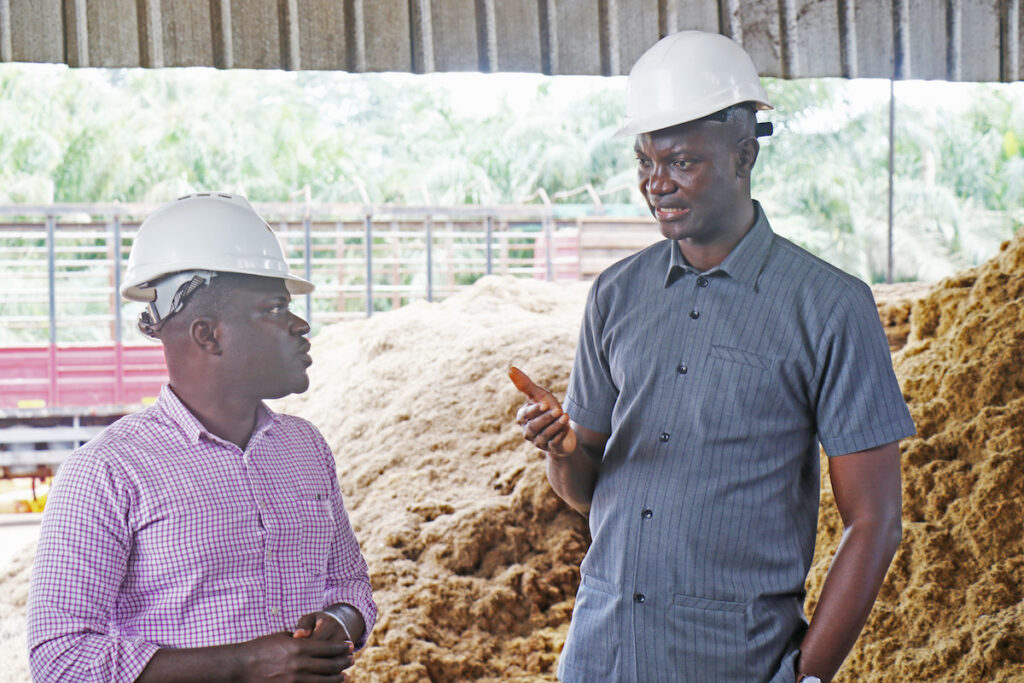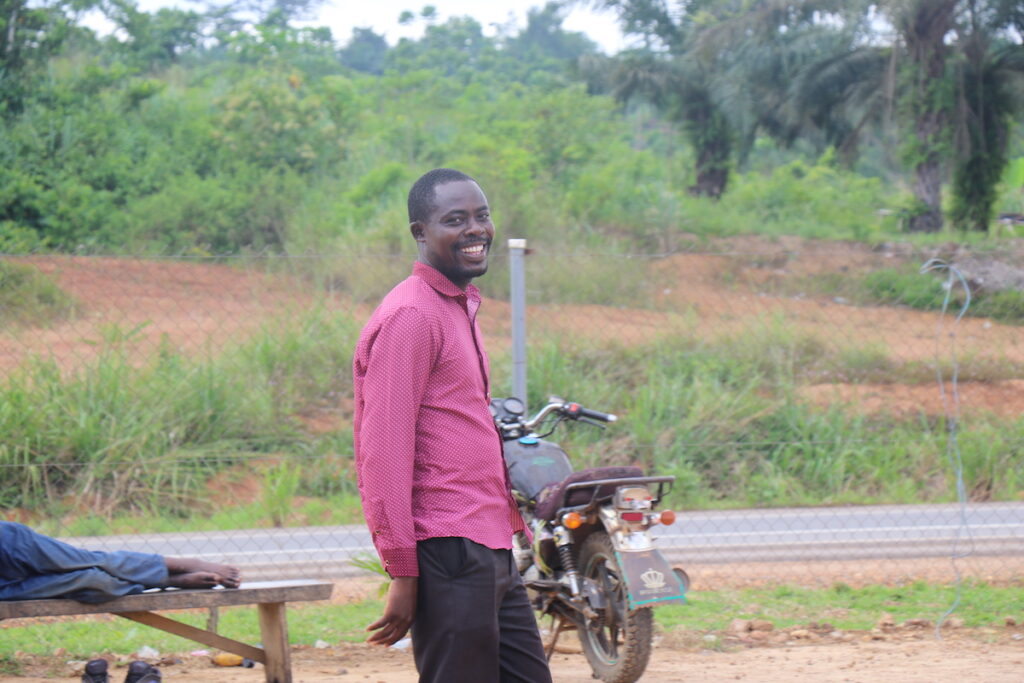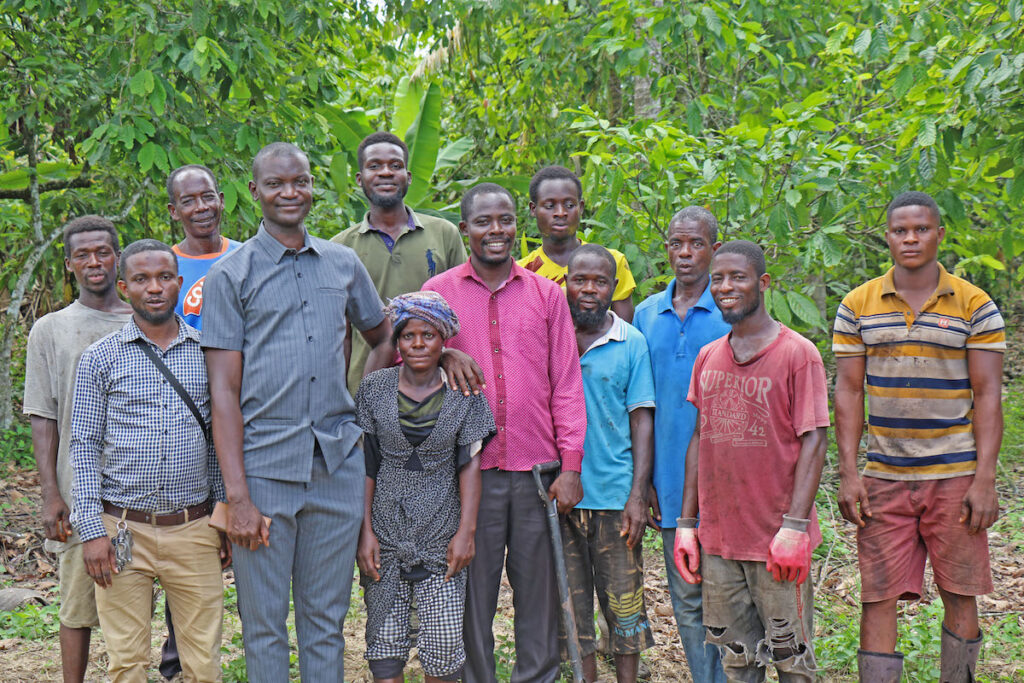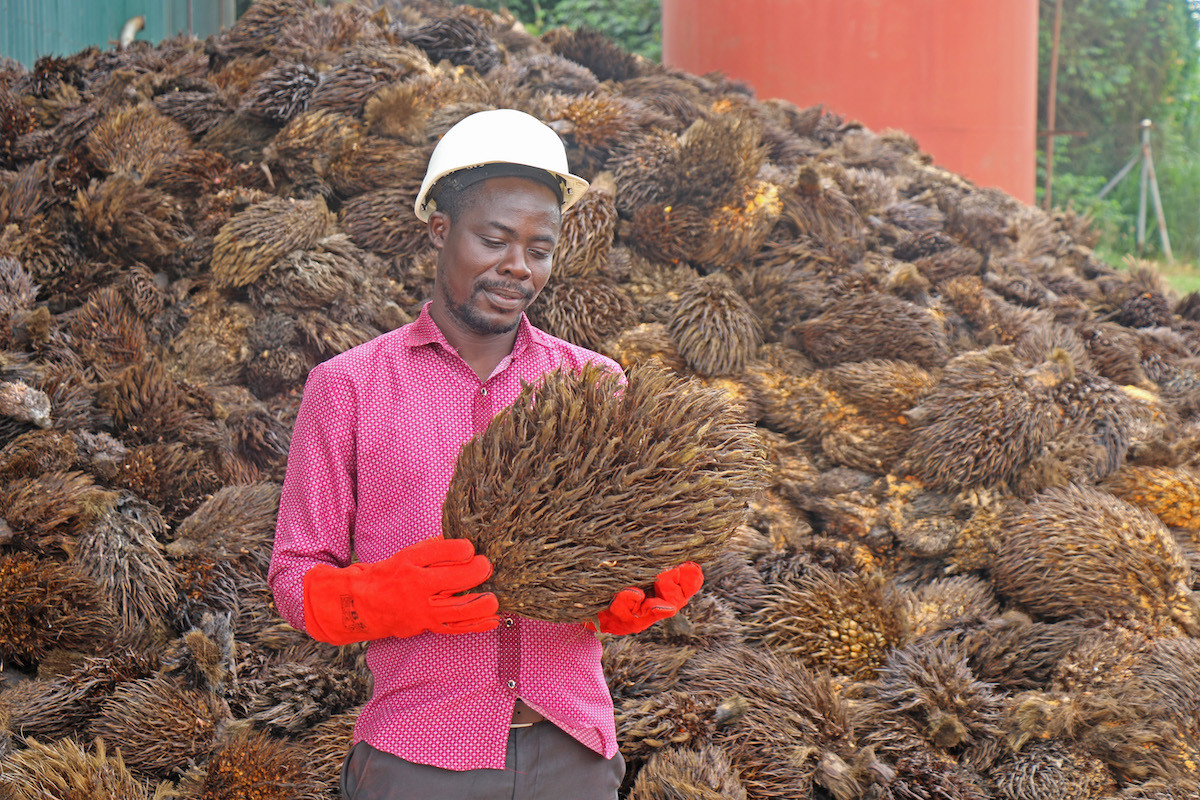Kwabena Mends at his innovative waste-to-compost project.
For many years, Kwabena has worked with Solidaridad to improve cocoa farming in Ghana. His business, EMFED Farms, provides training and farm management services to his neighbors. Now he has launched a programme to turn agricultural waste from oil palm, cocoa, and poultry into compost.
This ‘black gold’ compost has improved soil conditions on nearby cocoa and oil palm farms, and has reduced the need for expensive chemical fertilizers, which often have negative environmental impacts. This new effort to promote a circular production cycle that reuses and reintegrates waste products into farming products is aligned with Solidaridad’s goal of building a sustainable oil palm and cocoa sector in Ghana.
Bossman Owusu, Country Representative for Solidaridad Ghana, recently paid a visit to Kwabena to discuss his innovative solution to turn waste into compost, and to observe first-hand the production process.
The solution provided by Kwabena dovetails into food security, resilient supply chains, and circularity, all of which underpins what Solidaridad seeks to champion under our new programme, Acting Now.
Bossman Owusu, Country Representative for Solidaridad Ghana
Currently, Kwabena’s facility has the capacity to process 10 to 20 metric tonnes of agricultural waste per day. Bossman Owusu says that, “Next we will explore how we can help Kwabena increase production capacity and reduce reliance on imported fertilizer, which can be affected by external shocks.” Owusu also indicated that with support from Solidaridad, new production centres based on Kwabena’s model could be established in other oil palm and cocoa producing regions. This has the potential to drastically reduce the cost and associated emissions from transporting waste products to processing facilities.

Kwabena Mends’ Journey
Kwabena’s journey in sustainable agriculture began in 2013 when he enrolled in the first phase of Solidaridad’s Cocoa Rehabilitation and Intensification Programme (CORIP 1), which ran 2013-2017.
“Through CORIP, I became aware of the inefficiencies in our cocoa production practices, their negative environmental impact, and the implications for international trade. The programme helped me to refine my farming techniques and develop a keen interest in sustainable agriculture,” Kwabena says.
As part of the programme, Kwabena, together with other young entrepreneurs, received training from the International Fertilizer Development Center (IFDC) on ways to improve soil fertility. The training included site-specific trials on soil fertility that compared the effects of poultry droppings to inorganic inputs.
The results were a stark reminder that nature is highly efficient and resilient, and that waste from one organism can become valuable nutrients for another. This revelation inspired me to do more. After the programme ended, I combined my conventional farming knowledge with agronomy research to identify more waste materials that could be used to transform the agricultural landscape.
Kwabena Mends

Waste-to-Compost Cycle Brings New Benefits
Prior to Kwabena’s waste-to-compost programme, nearby farms and mills faced a hard choice between investing in expensive, but eco-friendly waste management systems, or paying a high price for the collection and appropriate disposal of their waste products.
James Amoako, the Managing Director for Assin Oil Mills, a palm oil processing company, described Kwabena’s innovation as a timely intervention to address the financial burden that waste management placed on the mill’s operation.
“Before our engagement with Kwabena, we had contracted waste collectors to collect our empty oil palm bunches and also paid for the preparation of the dumping site, which was costly. However, Kwabena’s solution has erased these costs,” he said.
James indicated that Kwabena supports their mill by providing bags of compost. He says, “So far, we have received 80 bags of 50kg compost from Kwabena, which we will distribute to oil palm farmers, who supply us with fresh fruit bunches, to help boost their yields.”
Kwabena’s waste-to-compost solution provides an environmentally friendly process that reutilizes the leftovers from oil palm and cocoa production, while lifting a financial burden from supply chain actors, like the Assin Oil Mills.
Incentives for Farmers in the Collection Process
To highlight the programme’s ease of use, Kwabena has mapped out a series of accessible collection points in the area around his facility. Plus, to meet the needs of farmers and mill operators, he has developed a rewards scheme to encourage farmers and mills to join his waste collection programme.
Currently, there are three engagement models available to farmers and nearby mill operators:
- Option one is a purchase arrangement where participants earn 12 Ghana cedis (1.2 USD dollars) for each tonne of waste they collect. The average cocoa farm produces 16 tonnes of waste per harvest cycle, so farmers can earn up to 240 Ghana cedis (20.41 dollars) as additional income.
- Option two, which most farmers prefer, is a blend of a payment for waste products and a supply of compost. This provides the farmer with additional income to address their immediate needs and bags of compost to improve their yields.
- Option three is strictly a waste-for-compost arrangement, where farmers receive a 50 kg bag of compost for each tonne of waste collected.
Charles Adu, a cocoa farmer from Assin North, signed up for the first option. He receives a cash payment for each ton of agricultural waste that he collects, and the money he receives is a welcome addition to his household budget.
“Previously, I had to pay waste collectors to collect cocoa husk from my farms. Today, the savings from my waste collection fees and the new payments I receive from Kwabena are helping to support my family,” Charles said.
He also notes that other waste collectors often take their time before picking up the piles of cocoa husks, which often leads to the growth of fungus on his farm. Kwabena’s prompt collection has helped to improve the overall health of his land.

Kwabena’s compost product not only enriches soil more effectively than most inorganic products, but it is environmentally friendly and helps farmers increase their yields. There are profound economic and environmental benefits from this circular reuse of agricultural waste, and Solidaridad supports Kwabena’s efforts to improve the lives of his neighbors in Ghana.

